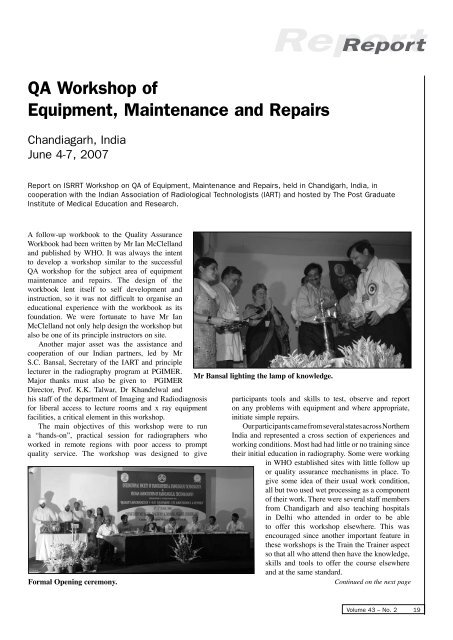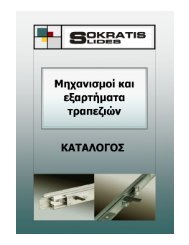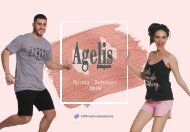isrrt Newsletter Volume 43. No.2 - 2007
You also want an ePaper? Increase the reach of your titles
YUMPU automatically turns print PDFs into web optimized ePapers that Google loves.
QA Workshop of<br />
Equipment, Maintenance and Repairs<br />
Chandiagarh, India<br />
June 4-7, <strong>2007</strong><br />
Report<br />
Report on ISRRT Workshop on QA of Equipment, Maintenance and Repairs, held in Chandigarh, India, in<br />
cooperation with the Indian Association of Radiological Technologists (IART) and hosted by The Post Graduate<br />
Institute of Medical Education and Research.<br />
A follow-up workbook to the Quality Assurance<br />
Workbook had been written by Mr Ian McClelland<br />
and published by WHO. It was always the intent<br />
to develop a workshop similar to the successful<br />
QA workshop for the subject area of equipment<br />
maintenance and repairs. The design of the<br />
workbook lent itself to self development and<br />
instruction, so it was not difficult to organise an<br />
educational experience with the workbook as its<br />
foundation. We were fortunate to have Mr Ian<br />
McClelland not only help design the workshop but<br />
also be one of its principle instructors on site.<br />
Another major asset was the assistance and<br />
cooperation of our Indian partners, led by Mr<br />
S.C. Bansal, Secretary of the IART and principle<br />
lecturer in the radiography program at PGIMER.<br />
Major thanks must also be given to PGIMER<br />
Director, Prof. K.K. Talwar, Dr Khandelwal and<br />
his staff of the department of Imaging and Radiodiagnosis<br />
for liberal access to lecture rooms and x ray equipment<br />
facilities, a critical element in this workshop.<br />
The main objectives of this workshop were to run<br />
a “hands-on”, practical session for radiographers who<br />
worked in remote regions with poor access to prompt<br />
quality service. The workshop was designed to give<br />
Formal Opening ceremony.<br />
Mr Bansal lighting the lamp of knowledge.<br />
participants tools and skills to test, observe and report<br />
on any problems with equipment and where appropriate,<br />
initiate simple repairs.<br />
Our participants came from several states across Northern<br />
India and represented a cross section of experiences and<br />
working conditions. Most had had little or no training since<br />
their initial education in radiography. Some were working<br />
in WHO established sites with little follow up<br />
or quality assurance mechanisms in place. To<br />
give some idea of their usual work condition,<br />
all but two used wet processing as a component<br />
of their work. There were several staff members<br />
from Chandigarh and also teaching hospitals<br />
in Delhi who attended in order to be able<br />
to offer this workshop elsewhere. This was<br />
encouraged since another important feature in<br />
these workshops is the Train the Trainer aspect<br />
so that all who attend then have the knowledge,<br />
skills and tools to offer the course elsewhere<br />
and at the same standard.<br />
Continued on the next page<br />
<strong>Volume</strong> 43 – No. 2 19

















